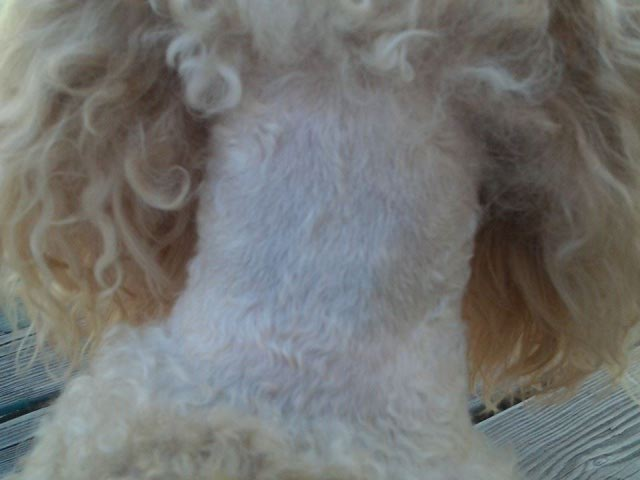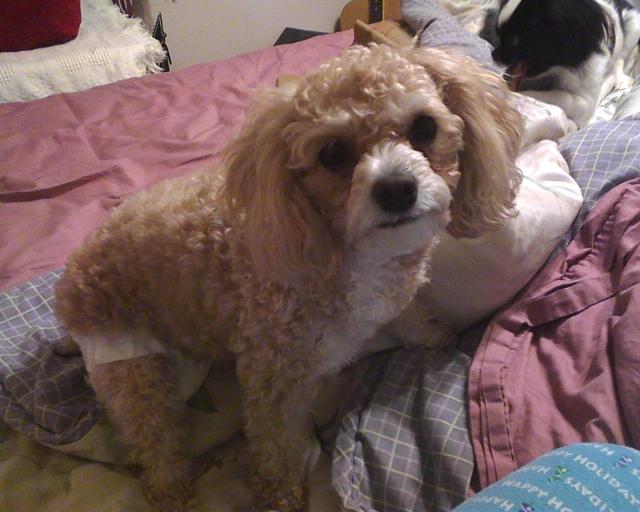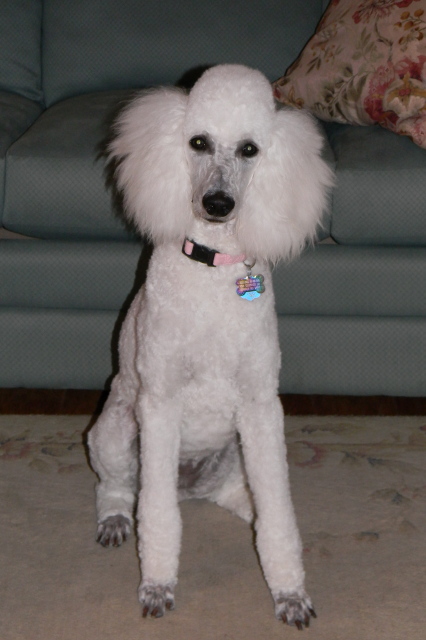QuestionI want to get a female standard poodle but I have heard horror stories about bringing home a cute little puppy who turns agressive. I have a 3 yr old and am worried about biting. Is this pet a good choice for our family? What is the breed truly like as books don't always tell the truth?
AnswerI have gotten that a lot too. Its just NOT true. Poodles should never be agressive. They are loving and loyal and highly intellegent and easy to train. I have had and bred many other breeds in the past and find the poodle best off all. Their only draw back is the grooming they require. My poodles have let kids pull on their hair and ears and even climb all over them and they LOVE it. If you find a reputable breeder, who works hard with their dogs and puppies and the puppy is well bred and well socialized then you wont have a bit of trouble. My standard poodles LOVE kids. They do not bite and are well socialized. You may want to find a breeder close to you that you can go visit. Check out their references and talk with their vet. Take the family and go meet the parents of the puppy. If the breeder wont show you the parents then go somewhere else. When you meet the parents make sure that you have a nice space that you can observe the way they move and interact with you. Do not be upset if some breeders wont let you in the areas that they have puppies. That is a precaution on their part to protect the puppies from something that you may bring in on your feet and clothes. However that should have no barring on you seeing the parents. Take a look around and see how clean their surroundings are. If you see anything that bothers you then move on and find another breeder. Your breeder should be someone that is very knowledgeable about their breed and has had other litters in the past. Not someone whom just put a male and female together and thought they wanted some cute puppies.
Now if its impossible to find a good breeder in your area or somewhere where you could drive to within a day or so then you can turn to finding a puppy over the internet. This is a little harder because most has to be done from pictures and descriptions, HOWEVER I have purchsed many of my poodles off line and I have rarely been dissapointed. There are reputable breeders out there that you will find and feel totally comfortable with regardless that you can not meet them. Their reputations preced them. They too will be highly knowledgeable and would love to talk with you about their dogs. Finding someone that shows their dogs in conformation events or other sporting events is a good clue as to the temeperment of their dogs. Mean and agressive dogs are NOT allowed and not tollerated at such shows. These dogs have to be well socialized to people and other dogs no matter their size. Also breeders that show their dogs are also proving their dogs over and over in their typiness and quality by gaining titles. I would also suggest a breeder that keeps their numbers down so that they have the time to work with each individual dog and puppy. 50 dogs in a kennel is a HUGE amount and to me I just cannot see how they can work with each dog so that they get the proper socialization. A breeder that keeps most of their dogs in home with them and raises their puppies underfoot is where you will get the best puppies in my oppinion.
Now remember too when getting a puppy that puppies play and explore with their mouths. They will probably want to chew on your fingers. A little bit of mouthing is ok but you want to make sure they arent getting too rough in their play. That part is up to you as the new owner. You will have to train the puppy as to what is expected of him. Whatever that may be. Raising a puppy is like raising a new baby. It takes time and patience and hard work, but oh is it sooooo worth it in the end.
Here is a list of questions to ask a potential breeder that you are interviewing for a puppy. How this breeder answers the questions and their willingness to answer questions is a good indication of the type of breeder they are. Once again if anything sticks out in your mind that makes you feel uncomforatable then find another breeder by all means. You should feel comfortable with your breeder and like long lost friends. That breeder should ALWAYS be available to answer your questions even after you have purchased their puppy. Another thing, when purchasing a puppy. If the breeder does not offer ATLEAST a written 2 year health guarantee, then go somewhere else. This is a breeder that will back up their puppies if something goes wrong. I am also including a list of what to look for in a potential puppy. Hope this helps you out.
How to recognize a good, reputable breeder from a back yard breeder or puppy mill.
Puppy mills care nothing about the dogs they raise or bring into the world. They produce puppies only for the profit aspect of these dogs. There is little to no socialization done with these puppies. Puppies are often shy, frightened, neglected, abused, and in poor health. Puppy mills are filthy set ups, with more often than not, a huge number of dogs of all breeds all crammed together in small crates or runs. There is no care given to the individual dog or even whom breeds to whom. Puppy mills often sell to pet stores or unknowing pet owners for big bucks and have no care for where their puppies are going or even if they get there in the long run. I am sure you have seen the horror stories about these places on the news.
Back yard breeders are a great stretch of the word breeder. Many know NOTHING about dogs in general and nothing about the breeds they are selling. The don't care about their puppies or back up their puppies if problems arise. If asked about the background or pedigree or general health of their lines, they will often tell you that they don't know anything and don't need to know anything as they aren't "into" showing. This category also includes those god owners that just want to breed their dog just because the dog has a "great" personality or because they want to show their children the miracle of birth. As I have said time after time these are NOT good enough reasons to breed.
A reputable breeder has great knowledge of their chosen breed and goes out of their way to learn everything they can about their breed. The dedicate every waking moment they can to caring for, playing with, training, and teaching their dogs. Most reputable breeders can tend to be fanatical about their breeds and their individual dogs. The thoroughly screen their new puppy owners and go out of their way to make sure each puppy goes to just the right home. A breeder works so very hard raising the best puppies they can and care deeply about each and every individual puppy. They try to teach Every new puppy owner everything about the breed that they can. A good breeder is always there for their new owners to help out in any way. Good breeders back up their puppies with at least a 1 year health guarantee against genetic defects. These are people who care about the breed and are willing to sacrifice almost anything to improve it. They breed for the best quality they can produce. They breed to the breed standards. They DO NOT cross breed. They try to do the most genetic testing on their breed they can do. They study backgrounds,colors and pedigrees to make sure that they are making the best matings they can. They ensure that the health of each puppy they produce is paramount!
How can I tell if I have found a good,reputable breeder?
A good breeder has nothing to hide. They will share every detail of their life's work with you. They will show you where the puppies are kept and the adults and are proud to show them off. Their facilities don't have to be big and flashy but they should be clean and well cared for. Each dog should be clean and groomed and look healthy and be happy. Most breeders love to show off their "babies" and this is a good indication of the kind of breeder that you are dealing with.
A good breeder backs up their puppies with at least a 1 yr health guarantee against genetic defects. Meaning they are willing to replace a puppy if there is a serious life threatening disease or genetic defect. Beware the breeders that give no guarantee or only a few days guarantee. These people are not the kind you want to be dealing with and if you run into them you should run the other way.
A good breeder will be very knowledgeable about their breed. They will sit down with you and teach you about the things you need to know to raise this breed. They do not apply pressure to people that are looking to buy and they go out of their way to make sure that you are getting the right puppy for you.
A good breeder will encourage you to ask many questions as I said these breeders have nothing to hide. Sometimes you can get to talking with a good breeder for a long while as they love to talk about their dogs.
A good breeder will always be honest with you when asking about their dogs. A good breeder will be up front with you when asking about the size of the parents and the puppies not just trying to shove a puppy on you to make the money. A good breed should know their dogs and what they will produce.
A good breeder will keep complete and easy to find and well organized records.
A good breeder is always going through changes in their breeding stock and their facilities making improvements. They are always trying to better themselves and their dogs. They genuinely care about the quality of puppies they are producing at that a new puppy owner is happy with their pet.
A good breeder does not have to be a show person to be a good breeder. Because they may not show does not mean that they are not a good breeder or that they have inferior quality dogs or less knowledge about their breed. Showing takes just the right person, a lot of money and a lot of gumption to get up in that ring and show their dog to their championship.
A good breeder is not just in it for the money. They are in it for the love of the breed. When all is said and done breeders do not make a whole lot of money on their puppies. Most of the money made is put back into their dogs. There are vet bills, grooming costs, feeding costs, upkeep, paperwork, advertising, and purchasing of new breeding stock to take into consideration. It is NOT a cheap venture or a quick money making scheme.
QUESTIONS TO ASK A POTENTIAL BREEDER
Here are some great questions to ask a breeder you are considering. Listen carefully to their answers and make sure you feel comfortable with the answers.
1- How long have you been breeding dogs?
2- How often do you breed a litter?
3- Do you consider this a business or a hobby?
4 - Why did you breed this litter?
5- What do you like or dislike about this breed?
6- What breed traits might not make this breed the right choice for me or my family?
7- What are your requirements for new owners?
8- Do you pick the puppy or do I get to choose from all or some of the puppies?
9- What are the health issues in this breed?
10- Where do you raise your puppies?
11- What do you feed your puppies?
12- What are the parents like?
13- Are the mother and father on the premises?
14- Are their any other relatives I could see?
15- Do you offer a contract or sales agreement? What are the terms?
16- Do you offer a health guarantee and what does it cover?
17- What health checks are done on the parents and the puppies?
18- Will you supply health clearance certification?
19- Will you supply the pedigree and registration when we take the puppy home?
20- Have any vaccines been given and what will be needed once puppy leaves?
21- What was the date of the last worming?
22- What kind of training does this breed require?
23- Are you available for long time help with training or behavior questions or problems?
24- what happens if we cannot keep the dog?
When purchasing your puppy in person, there are certain things you will want to look for to ensure that the puppy you are buying is healthy. Here is a check list.
1- Does the puppy have a clean, shiny, smooth coat without any skin rashes or lessions?
2- Does the puppy have bright, clear, open eyes? Eyes should not have any discharge, be blood shot, or have strange coloring or yellowness to the whites of the eyes. The puppy should not squint or rub at its eyes. Take notice if the puppy acts like it sees properly.
3- Does the puppy have a healthy appetite if you are able to watch a feeding.
4- Does the puppy have bloody diarrhea or vomiting? These are warning signs of diseases such as coccidea, giardia, or parvo.
5- Does the puppy have normal stools and regular urination? Remember that young puppies that have been weaned recently will have softer stools than other puppies. Also puppies that are teething may have soft stools also.
6- Does the puppy cough or gag? These can be signs of kennel cough or collapsing trachea.
7- Does the puppy continually lick the urinary tract opening? This could be signs of an infection.
8- Does the puppy have thick, colored, mucousy drainage from the eyes, ears, rectal area or mouth. These can also be signs of illness.
9- Does the puppy limp or jerk up one leg? These could be signs of hip or patellar problems.
10- Does the puppy's activity level seem normal? Remember that most puppies sleep for 2-3 hours at a time. When puppies are awake they should be energetic and exploring their surrounding with enthusiasm.
11- Is the puppy playful and happy? Or are they weak and lethargic?
12- Does the puppy seem to be off on its own all the time? Puppies should be social and wanting to play with their siblings. A little bit of autonomy is ok.
13- Does the puppy seem to have good body weight? Puppies should not look too skinny and ribs should not be showing.
14- Does the puppy have a potbelly? This is a sign of worms. Remember this is hard to tell if puppy has just had a meal. You need to see if the puppy has a continual potbelly look to them.
15- Is the puppy eating and drinking on their own? Remember that puppies wean at different ages depending upon their mothers their breed and their size. Some are much faster than others. Breeders should never sell a puppy that is not weaned.
16- Is the puppy eager to come up and meet you? If a puppy seems reserved and shy it might mean that the puppies have not been properly socialized.

 Precious Yorki Poo Coat
Question
PJ
Hello,
I have an 8 month old Yorkie poo. Re
Precious Yorki Poo Coat
Question
PJ
Hello,
I have an 8 month old Yorkie poo. Re
 Bruising coloration
QuestionQUESTION: Hi...I have a 5 yr old male Toy Poodl
Bruising coloration
QuestionQUESTION: Hi...I have a 5 yr old male Toy Poodl
 17 yr old Toy poodle rescue
Question
Pax
We resecued a pair of poodles at 1
17 yr old Toy poodle rescue
Question
Pax
We resecued a pair of poodles at 1
 pregnant toy poodle
Question
Amber Leigh :)
My female toy poodle is
pregnant toy poodle
Question
Amber Leigh :)
My female toy poodle is
 skittish about new things
Question
female standard poodl
We got our female stand
skittish about new things
Question
female standard poodl
We got our female stand